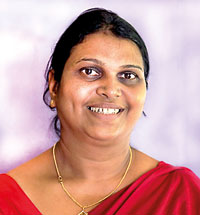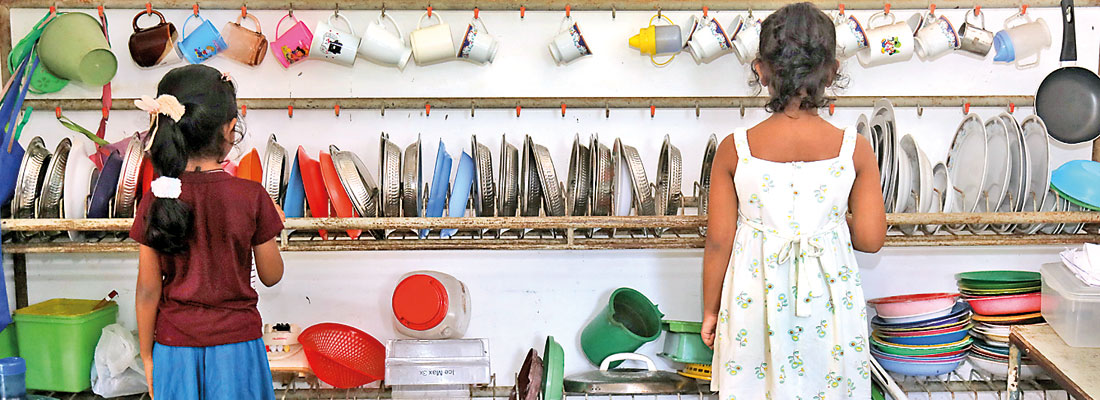News
Women workers endure the biggest blows from economic collapse
View(s):By Mimi alphonsus
From housekeepers and migrant workers to factory workers, farmers, and home-makers, working women’s lives have been torn apart by the economic crisis. Through debt traps, informal, unprotected jobs, domestic violence, and increased chores at home, no aspect of women’s lives have gone untouched.
The economic crisis has increased informalisation of women’s employment prospects.

Nilupa Jayalal: Runs the day care centre at Katunayake FTZ
At factories this has taken place through manpower agencies.
According to a December 2024 report by the Human Rights Commission of Sri Lanka (HRCSL), for decades, factories have been increasingly relying on manpower agencies — essentially organisations (or individuals) that rent out workers for the day — rather than permanent staff. This phenomenon was further aggravated during the economic crisis as manufacturing orders fluctuated.
There are huge issues with manpower work, especially for women, as highlighted by the HRCSL report. There is a lack of basic workplace protections, standard employee health and EPF/ ETF benefits, and a steady, dependable income.
Manpower workers are at higher risk of abuse and many are effectively employed without any signed employment agreement.
Despite this, many people seek out manpower agencies in an attempt to manage the increased cost of living, said the HRCSL report. Older women who had previously retired from their garment factory jobs returned through manpower agencies after the economic crisis.
Single mothers started to resign from their permanent factory jobs in favour of manpower work because they could no longer afford daycare facilities.
Chamila Thushari is the executive director of Dabindu Collective, a non-profit dedicated to defending women’s rights inside Free Trade Zones (FTZ). She said that single mothers preferred the flexibility of the manpower daily wage system to balance the responsibilities of a worker and a mother, particularly due to the economic crisis.
Most workers are from outside the Western Province and thus cannot rely on relatives to care for their children, but day care facilities are expensive, she said. 
There are day cares centres in some FTZ run by the Board of Investment. However, at Katunayake they cost Rs. 3,500 a month.
Nilupa Jayalal, who runs the day care centre at Katunayake FTZ said that the centre is operating at capacity and there are already children on the waitlist for next year.
So instead, some women pay for low-quality private day care or leave their young children in their rented boarding houses. “In some cases they leave groups of children at the boarding houses with an older child,” explained Ms Thushari, “it is not a secure environment but there aren’t other options.”
Mary (name changed) was one such mother. Her husband left her soon after she had her second child. Leaving her permanent job as a garment factory worker she then returned through a manpower agency.
“I couldn’t take a permanent job because my son was not yet going to school,” she said. “But money is never guaranteed with manpower work.” Both Ms Mary’s children now go to school and she has returned to work permanently. But now she faces a new problem. “Books and school expenses are expensive and they haven’t increased the wages.”
In rural areas, too, more and more women are turning to unstable, daily wage work.

The day care centre at Katunayake FTZ. Pix by M.A. Pushpa Kumara
Research by Suriya Women’s Development Centre in Batticaloa found that women farmers have given up cultivation and livestock rearing because of the high costs of inputs and insufficient demand for products. Instead they opt for daily wage work.
Many women also seek jobs in shops, or domestic work either locally, or abroad. Domestic work or shop work is attractive because of the relative flexibility, as the unpaid work of child care and household chores constantly haunt women’s decisions about their labour.
Domestic workers and other informal employees do not have contracts or most employee protections. According to the 2023 Labour Force Survey by the Department of Census and Statistics (DCS), 60% of working women are informally employed.
A lot of young women join shops as “trainees” on a verbal promise that they will be hired after a few months and be paid reasonably, explained Elangeswary Arunasalam who works for Suriya Women’s Development Centre.
However, often the businesses go back on promises and instead rehire other trainees. “They get a lot of work from such cheap trainees during the busy seasons and then drop them,” she said.
Ms Krishanthi (name changed) is a 25 year old domestic worker. She worked in her home town of Nuwara Eliya before leaving her four year old son in the care of her mother to move to Colombo for work. She works from 5 am to 10 pm every day for Rs. 35, 000 a month. Her husband does not support her and their son financially.
Ms Krishanthi’s employers make her eat food that is separate from their own and insist that she use a separate bathroom.
“I have to change their bedsheets with minimal touching because they don’t like it when my hands brush their sheets,” she said. “I suffer all these indignities because I have no choice.” Ms Krishanthi said that she has thought about finding other work but isn’t able to. “I have friends who work for even Rs. 700 per day. There is no decent work for women, so I cling to this.” She tears up as she shares how she worries about her son and has no time even to call and check on him.
Maithily Karuppiah, the president of Protect Union which represents informal workers, explained that women are unable to ask for a decent wage for domestic work because “nowadays there is always someone who is willing to work for less’’. She said that unlike men’s daily wage work which over time has been set at a certain rate, women’s wages fluctuate.
Indeed, according to the United Nations the gender pay gap in Sri Lanka in 2020 was 24%. Among daily wage earners, the difference is even more stark. According to the 2023 Labour Force Survey, daily wage women earn only Rs. 17,527 per month on average — about half what men earn.
Many women resort to borrowing from loan sharks, often at high interest rates. When the women are unable to repay they get caught up in a cycle of debt. According to the Household Survey on the Impact of the Economic Crisis by the DCS, 34% of all borrowings were to either to pay back existing loans or to purchase food items.
| Socio-economic factors make homes a hell After a long day’s work, women return to their homes to begin their second jobs as home-makers. But here too, the economic crisis has left its mark. According to the World Food Programme, 17% of Sri Lankans face moderate acute food insecurity. They reduce the number of meals or eat only rice. When food is scarce, women in particular sacrifice their own nutritional intake to ensure their children have enough. Some women entered the workforce for the first time during the economic crisis as their husbands lost jobs, or did not earn enough. However, this shift in the breadwinner role did not translate to a redistribution of housework and childcare with husbands. Instead, girl children often replace their working mothers in the kitchen. “There is a lot of irregular school attendance among girl children above the age of 10,” said a Women’s Development Officer who requested anonymity. She said that the systems in place to ensure that children are protected when women emigrate are not working. In cases where both parents are overseas, the guardianship form that grandparents or other relatives sign is just a “formality”. In reality, she said, girl children manage the family alone, even when a father is present, cooking, cleaning and taking care of the children. The officer added that girl children have become increasingly vulnerable to child abuse as a result of taking on this adult role. The officer said she has witnessed family problems skyrocket since the economic crisis began as financial instability, alcoholism, changing gender roles, and long term separation due to migrant work, strain relationships. Domestic violence too, has worsened. Jerusha Crosette-Thambiah, a lawyer who specialises in sexual and gender based violence cases, said that the “shadow pandemic” of domestic violence that started during the coronavirus epidemic has continued throughout the economic crisis. Women are not just at risk of physical violence but also emotional abuse, economic abuse, and cyber sexual violence. Unfortunately, judges predominantly prioritise physical violence cases over other forms, she said. Moreover, a severe shortage of shelters and budget for legal assistance has made it hard for poor women to seek justice or even some relief, she said. | |
The best way to say that you found the home of your dreams is by finding it on Hitad.lk. We have listings for apartments for sale or rent in Sri Lanka, no matter what locale you're looking for! Whether you live in Colombo, Galle, Kandy, Matara, Jaffna and more - we've got them all!

